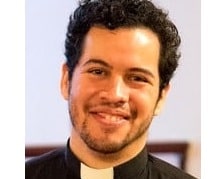Could self-sufficiency
be redeemed?
But who would want
such a thing?
Certainly not one who asked
Mary for life, or one
who needed friends along
the way of discipleship, or
one who called on an Abba-God, or one
who fell onto God’s Spirit
like a limp body
in need of support just to
face the morning sun
or one who said, “This is my body and my blood,
eat me
because you need me in you.”
Certainly not one who on a cross
killed the illusion of
self-sufficiency.
Willie J. Jennings, After Whiteness: An Education in Belonging (Eerdmans, 2020)
We live in a world where self-sufficiency is a priced commodity. It’s a natural desire, of course—we wish for our children to experience the goodness of honest work and a decent living. We hope that they will be able to support themselves once they leave the nest; we want them to have as many options available to them as possible.
We don’t have to look far to realize that our lives are more complicated than that, though. There are always at least two ways to tell our story: one has to do with our accomplishments, our hard work, our well-earned spot in the corporate ladder. The other has to do with the people and resources that made it possible: the family, friends, and mentors who provided support; the employer who gave us a chance when others wouldn’t; the safety net that allowed for our youthful mistakes to be a bleep in the radar rather than an irrevocable mark on our record.
It doesn’t take much, you see, to poke holes in the illusion of self-sufficiency. And there are plenty of other moments that pull the rug from under our feet, too—the loss of a loved one, the unpredictability of the market, an unexpected diagnosis or a debilitating disease. In these moments, the bulwarks we’ve created to protect ourselves from the unpredictable creak and groan. We are not self-sufficient. There are limits to our life, and coming to terms with them is no easy task.
The good news, strangely enough, lie on the other side. Our modern way of life has trained us to believe that we can be an island unto ourselves, but Christian discipleship involves a radical repudiation of anything of the sort—we are limited, finite creatures, dependent on the God in whom we live and breathe, and members of a Body much larger than we can imagine. There, in that space where we come face-to-face with our dependence and fragility, a new opportunity awakens: the experience of vulnerability.
Like most things that are worth our effort, it is a rich, beautiful, and dangerous gift. In that risky terrain lies the path to true fulfillment—the way that makes belonging possible.
— Fr. Javier


